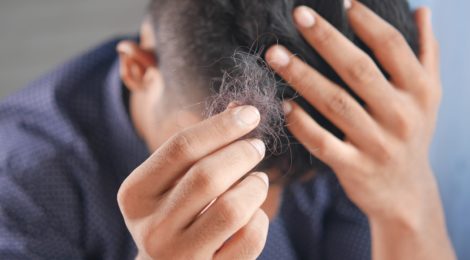
Beyond Hair Loss, Alopecia Areata Brings Anxiety and Stress
Our hair has so many implications for our self-image and mental health. For those affected by alopecia areata, an autoimmune disease that causes severe hair loss, struggles around hair and self-esteem can be a daily issue.
Abby (name changed for anonymity), first experienced signs of alopecia areata when she noticed a bald spot on her head about the size of a dime. Within 6-8 weeks of discovering it, she had lost all her hair. Physically, alopecia areata may not look debilitating, but Abby explains that emotionally, she felt like her loss of femininity destroyed her. As time passed, she was able to shift her perspective and self-image, deciding that despite looking different, she was more than her hair.
“I rocked my bald head just like I used to rock my long locks. I used to associate hair with femininity but after alopecia areata, I realized that feeling feminine comes from within!”

The Trauma and Mental Health Report spoke with Jeff Donovan, a dermatologist specializing in the treatment of hair loss, on alopecia areata. Donovan explains that both men and women can be affected by self-conscious thoughts when experiencing hair loss. Hair loss associated with alopecia areata not only affects the scalp area, but also the beard, eyebrows, eyelashes, and armpits. For many, hair can represent more than just societal standards. For example, in the Sikh religion, hair is a representation of God’s creation, which is why those who practice, no matter their gender, keep their hair untouched.
While more mental health resources for those affected by alopecia areata are needed, the Canadian Alopecia Areata Foundation (CANAAF) provides support and education to both newly diagnosed individuals as well as those who have been living with alopecia areata for a prolonged period. Anthony Gilding, the Director of Science and Research with CANAAF, explains that those living with alopecia may become fearful of how people will perceive them, which can impact their social lives. Additionally mental health struggles like are the most commonly reported psychological comorbidities of alopecia areata.
Gilding conducted a study on the impact of alopecia areata on patients’ and caregivers’ quality of life and mental health, and found that many showed high risk for adjustment disorder and severe social anxiety. In addition, individuals living with alopecia areata spent hundreds to thousands of dollars on cosmetic cover-ups, like hair pieces and eyebrow microblading.

Finding treatment options can be a stressful task for those affected by alopecia areata, as there are long waitlists to see a specialist. Donovan explains that Baricitinib, a Janus Kinase inhibitor (JAK), is a new FDA-approved drug that treats alopecia areata, however it is still in the process of being approved in Canada. While promising, Other temporary treatment options include wigs, platelet-rich plasma (PRP) injections, and tablet scalp tattooing (micropigmentation). Unfortunately, these treatments can be expensive.
Without knowing what triggers this autoimmune disease, the changes in physical appearance paired with no specific treatment option can leave people who are affected in a grey area where they are expected to accept their situation. This can be hard to cope with, especially when mental health resources are limited.
-Jasleen Ghuman, Contributing Writer
Image credits:
Feature: Towfiqu barbhuiya at Unsplash, Creative Commons
First: Gadiel Lazcano at Unsplash, Creative Commons
Second: Maria Lupan at Unsplash, Creative Commons



